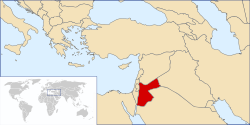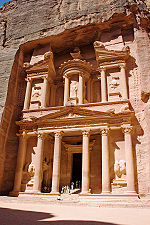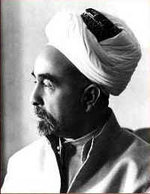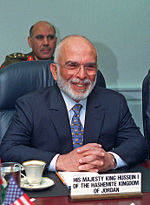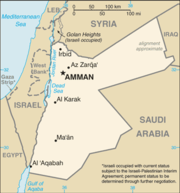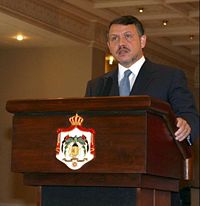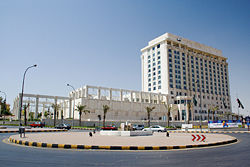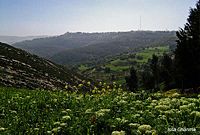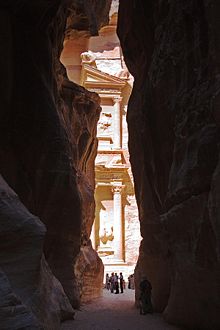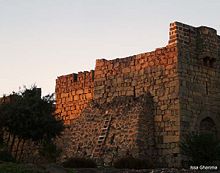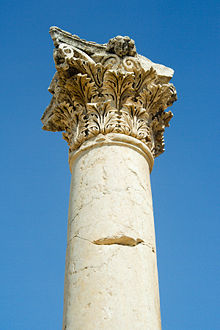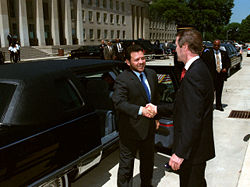Jordan
2008/9 Schools Wikipedia Selection. Related subjects: Middle Eastern Countries
| ' 'المملكة الأردنية الهاشميه Al-Mamlakah al-Urdunniyyah al-Hāšimiyyah The Hashemite Kingdom of Jordan
|
||||||
|---|---|---|---|---|---|---|
|
||||||
| Anthem: عاش المليك The Royal Anthem of Jordan ("As-salam al-malaki al-urdoni")1 Long live the King |
||||||
|
|
||||||
| Capital (and largest city) |
Amman |
|||||
| Official languages | Arabic | |||||
| Demonym | Jordanian | |||||
| Government | Constitutional monarchy | |||||
| - | King | Abdullah | ||||
| - | Prime Minister | Nader al-Dahabi | ||||
| Independence | ||||||
| - | End of British League of Nations mandate |
25 May 1946 |
||||
| Area | ||||||
| - | Total | 89,342 km² ( 112th) 45,495 sq mi |
||||
| - | Water (%) | 0.8 | ||||
| Population | ||||||
| - | July 2007 estimate | 6,053,193 ( 110th) | ||||
| - | 2004 census | 5,100,000 | ||||
| - | Density | 64/km² ( 131st) 166/sq mi |
||||
| GDP ( PPP) | 2005 estimate | |||||
| - | Total | $27.96 billion ( 97th) | ||||
| - | Per capita | $4,900 ( 103rd) | ||||
| Gini (2002–03) | 38.8 (medium) | |||||
| HDI (2007) | ▲ 0.773 (medium) ( 86th) | |||||
| Currency | Jordanian dinar ( JOD) |
|||||
| Time zone | UTC+2 ( UTC+2) | |||||
| - | Summer ( DST) | UTC+3 ( UTC+3) | ||||
| Internet TLD | .jo | |||||
| Calling code | +962 | |||||
| 1 | Also serves as the Royal anthem. | |||||
Jordan (Arabic: الأردنّ, transliterated as al-Urdunn), officially the Hashemite Kingdom of Jordan (المملكة الأردنية الهاشمية), is a country in the Arab World in Southwest Asia, bordered by Syria to the north, Iraq to the north-east, Israel and the West Bank to the west, and Saudi Arabia to the east and south. It shares the coastlines of the Dead Sea, and the Gulf of Aqaba with Israel, Saudi Arabia, and Egypt.
The Hashemite Kingdom of Jordan is a constitutional monarchy with representative government. The reigning monarch is the head of state, the chief executive and the commander-in-chief of the armed forces. The king exercises his executive authority through the prime ministers and the Council of Ministers, or cabinet. The cabinet, meanwhile, is responsible before the elected House of Deputies which, along with the House of Notables (Senate), constitutes the legislative branch of the government. The judicial branch is an independent branch of the government.
History
With the break-up of the Ottoman Empire at the end of World War I, the League of Nations created the French Mandate of Syria and British Mandate Palestine. Approximately 90% of the British Mandate of Palestine was east of the Jordan river and was known as " Transjordan". In 1921 , the British gave semi-autonomous control of Transjordan to the future King Abdullah I of Jordan, of the Hashemite family. Abdullah I continued to rule until a Palestinian Arab assassinated him in 1951 as he was departing from the al-Aqsa Mosque in Jerusalem. At first he ruled "Transjordan", under British supervision until after World War II. In 1946, the British requested that the United Nations approve an end to British Mandate rule in Transjordan. Following this approval, the Jordanian Parliament proclaimed King Abdullah as the first ruler of the Hashemite Kingdom of Jordan.
In 1950, Jordan annexed the West Bank, which had been under its control since the armistice that followed the 1948 Arab-Israeli war. The annexation was recognized only by the United Kingdom (de facto in the case of East Jerusalem).
In 1965, there was an exchange of land between Saudi Arabia and Jordan. Jordan gave up a relatively large area of inland desert in return for a small piece of sea-shore near Aqaba.
Jordan signed a mutual defense pact in May 1967 with Egypt, and it participated in the June 1967 war against Israel along with Syria, Egypt, and Iraq. During the war, Jordan lost the West Bank and East Jerusalem to Israel (the western sector having been under Israeli control). In 1988, Jordan renounced all claims to the West Bank but retained an administrative role pending a final settlement, and its 1994 treaty with Israel allowed for a continuing Jordanian role in Muslim and Christian holy places in Jerusalem.
The 1967 war led to a dramatic increase in the number of Palestinians, especially from the West Bank, living in Jordan. Its Palestinian refugee population — 700,000 in 1966 — grew by another 300,000 from the West Bank. The period following the 1967 war saw an upsurge in the power and importance of Palestinian resistance elements ( fedayeen) in Jordan. King Hussein's armed forces targeted the fedayeen, and open fighting erupted in June 1970. The battle in which Palestinian fighters from various Palestine Liberation Organization (PLO) groups were expelled from Jordan is commonly known as Black September.
The heaviest fighting occurred in northern Jordan and Amman. The Syrian army battled the Jordanian army in Amman and other urban areas. The global media portrayed King Hussein as a corrupt King slaughtering the Palestinian refugees. Other Arab governments attempted to work out a peaceful solution. In the ensuing heavy fighting, a Syrian tank force invaded northern Jordan to support the fedayeen but subsequently retreated. King Hussein asked "the United States and Great Britain to intervene in the war in Jordan, asking the United States, in fact, to attack Syria, and some transcripts of diplomatic communiques show that Hussein requested Israeli intervention against Syria. " Israel, which found the move undesirable threatened that it would invade Jordan if Syria intervened, so performed mock air strikes on the Syrian column at the Americans' request. Possibly alarmed at the prospect of an armed conflict with Israel, Syria's president at the time, Nureddin Atassi, ordered a hasty retreat. By September 22, Arab foreign ministers meeting at Cairo had arranged a cease-fire beginning the following day. Sporadic violence continued, however, until Jordanian forces, led by Habis Al-Majali, with the help of Iraqi forces (who had bases in Jordan after the war of 1967), won a decisive victory over the fedayeen on July 1971, expelling them from the country.
At the Rabat summit conference in 1974, Jordan agreed, along with the rest of the Arab League, that the PLO was the "sole legitimate representative of the Palestinian people", thereby relinquishing to that organization its role as representative of the West Bank.
Fighting occurred along the 1967 Jordan River cease-fire line during the October 1973 Arab-Israeli war. Jordan sent a brigade to Syria to fight Israeli units on Syrian territory but did not engage Israeli forces from Jordanian territory. Jordan did not participate in the Gulf War of 1990–91. In 1991, Jordan agreed, along with Syria, Lebanon, and Palestinian fedayeen representatives, to participate in direct peace negotiations with Israel at the Madrid Conference, sponsored by the U.S. and Russia. It negotiated an end to hostilities with Israel and signed a declaration to that effect on July 25, 1994 (see Washington Declaration). As a result, an Israeli-Jordanian peace treaty was concluded on October 26, 1994. Following the outbreak of Israel-Palestinian Authority fighting in September 2000, the Jordanian government offered its good offices to both parties. Jordan has since sought to remain at peace with all of its neighbors.
On November 9, 2005 Jordan experienced three simultaneous bombings at hotels in Amman. At least 57 people died and 115 were wounded. " Al-Qaeda in Iraq", a group led by terrorist Abu Musab al-Zarqawi, a native Jordanian, claimed responsibility.
Geography
Jordan is a Southwest Asian country, bordered by Syria to the north, Iraq to the northeast, Saudi Arabia to the east and south and Israel and the West Bank to the west. All these border lines add up to 1,619 km (1,006 mi). The Gulf of Aqaba and the Dead Sea also touch the country, and thus Jordan has a coastline of 26 km (16 mi).
Jordan consists of arid forest plateau in the east irrigated by oasis and seasonal water streams, with highland area in the west of arble land and Mediterranean evergreen forestry. The Great Rift Valley of the Jordan River separates Jordan, the west bank and Israel. The highest point in the country is Jabal Ram, it is 1,734 m (5,689 ft) above sea level, while the lowest is the Dead Sea -420 m (−1,378 ft). Jordan is part of a region considered to be "the cradle of civilization", the Levant region of the Fertile Crescent.
Major cities include the capital Amman in the northwest, Irbid and Az Zarqa, both in the north. Karak and Aqaba in the south.
The climate in Jordan is dry in summer with average temperature in the mid-30°C (mid-90°F) and relatively cold in winter averaging around the 0 °C (32 °F). The western part of the country receives greater precipitation during the winter season from November to March and snowfall in Amman (756 m (2,480 ft) ~ 980 m (3,215 ft) above sea-level) and Western Heights of 500 m (1,640 ft). Excluding the rift valley the rest of the country is entirely above 300 m (984 ft)(SL).
Administrative Divisions
Administratively, Jordan is divided into 12 provinces called governorates, each headed by a governor appointed by the king. They are the sole authorities for all government departments and development projects in their respective areas. The Governorates are:
| Province | Population (2008 est.) | Capital city | Population (Metropolitan, 2008 est) |
|---|---|---|---|
| Ajlun Governorate | 118,496 | Ajlun | 8,161 |
| Amman Governorate | 1,939,405 | Amman | 1,135,733 |
| Aqaba Governorate | 107,115 | Aqaba | 95,408 |
| Balqa Governorate | 349,580 | Assalt | 87,778 |
| Irbid Governorate | 950,700 | Irbid | 650,000 |
| Jerash Governorate | 156,680 | Jerash | 39,540 |
| Kerak Governorate | 214,225 | Kerak | 22,580 |
| Ma'an Governorate | 103,920 | Ma'an | 30,050 |
| Madaba Governorate | 135,890 | Madaba | 83,180 |
| Mafraq Governorate | 245,670 | Mafraq | 56,340 |
| Tafilah Governorate | 81,000 | Tafilah | |
| Zarqa Governorate | 838,250 | Zarqa | 447,880 |
The Governorates are subdivided into approximately fifty-two nahias.
Demographics
The Jordan National Census for the year 2004, which was released on October 1st of the same year, gave the following results:
1. As of October 1st 2004, Jordan had a population of 5,100,981. The census estimated that there are another 190,000 who were not counted (for being out of the country at the time the census was taken, or did not turn in their forms).
2. The census showed that the national growth rate was 2.5% (at maximum) compared to 3.3% of the 1994 census.
3. The census of 2004 also shows that males made up 51.5% of Jordan's population (2,628,717). Females: 2,472,264 (48.5%).
4. Jordanian citizens made up 93% of the population (4,750,463), while non Jordanins made up 7% (349,933). However, it is estimated that most of those who did not turn in their forms were immigrants from neighboring countries, or non Arabic-speaking foreigners.
5. There were 946,000 families in Jordan in 2004, with an average of 5.3 persons/family (compared to 6 persons/family for the census of 1994). The next census is scheduled to take place in 2014.
During the years 2004-2007, Jordan saw a rapid increase in its population due to the heavy immigration of Iraqis, an independent census carried in 2007, estimated that there are 700,000 Iraqis residing in Jordan. Most estimates put the population of Jordan slightly over 6,000,000 as of the year 2007.
95% of Jordan's population are Arabs, the remaining non-Arabs of the population are mainly Circassians, Chechens, Armenians ( 13th largest in the world), and Kurds, but have integrated into the Jordanian and Arab cultures in the country.Many Native Jordanians are also of European origin assimilated into the Arabophone genepool that has resulted from the vast history of civilisations on its land.
The number of Lebanese permanently settling in Jordan since the 2006 Israel-Lebanon conflict has not been established, and is estimated to be very little. According to Labour Ministry figures, the number of guest workers in the country now stands just over 300,000, most are Egyptians who makeup 227,000 of the foreign labor, and the remaining 36,150 workers are mostly from Bangladesh, China, Sri Lanka and India. Since the Iraq War many Christians ( Assyrians and Chaldeans) from Iraq have settled permanently or temporarily in Jordan.
Jordanian Christians permanently residing in Jordan form approximately 6% of the population and are allocated 10% of the seats in parliament (The Department of Statistics released no information about the religion distribution from the census of 2004). Most Christians belong to the Greek Orthodox church (called "Ruum Urthudux" in Arabic). The rest are Roman Catholics (called "Lateen"), Eastern Catholics who are Melkites (called "Ruum Katoleek" to distinguish them from "Western Catholics"), and various Protestant communities including Baptists. Christians in Jordan are of many nationalities, as evinced, for example, by the Catholic mass being celebrated in Arabic, English, French, Italian, Spanish, Tagalog and Sinhala, as well as in Iraqi dialects of Arabic. However, Jordanian Christians are indigenous Arabs that share the Greater culture of Jordan and the Broader East Mediterranean Levantine Arab Identity.
Other Jordanians belonging to religious minorities include adherents to the Druze and Bahá'í Faith, which fall administratively under Islamic denomination. The Druze are mainly located in the Eastern Oasis Town of Azraq and the city of Zarka, while the Village of Adassiyeh bordering The Jordan Valley is home to Jordan's Bahá'í community.
The official language is Arabic, but English is used widely in commerce and government and among educated people. Arabic and English are obligatory learning at public and private schools. French is taught at some public and private schools but is not obligatory. However, a vibrant Francophone community has emerged in modern Jordan. Radio Jordan offers radio services in Arabic, English and French.
A portion of the people are registered as Palestinian refugees and displaced persons reside in Jordan, most as citizens. Since 2003 many Iraqis fleeing the Iraq War have settled in Jordan; latest estimates indicate between 700,000 and 1.7 million Iraqis living in Jordan; mainly in Amman, the capital.
Politics
Constitution
Jordan is a constitutional monarchy based on the constitution promulgated on January 8, 1952. Executive authority is vested in the king and his council of ministers. The king signs and executes all laws. His veto power may be overridden by a two-thirds vote of both houses of the National Assembly. He appoints and may dismiss all judges by decree, approves amendments to the constitution, declares war, and commands the armed forces. Cabinet decisions, court judgments, and the national currency are issued in his name. The council of ministers, led by a prime minister, is appointed by the king, who may dismiss other cabinet members at the prime minister's request. The cabinet is responsible to the Chamber of Deputies on matters of general policy and can be forced to resign by a two-thirds vote of "no confidence" by that body.
The constitution provides for three categories of courts: civil, religious, and special. Administratively, Jordan is divided into twelve governorates, each headed by a governor appointed by the king. They are the sole authorities for all government departments and development projects in their respective areas.
The Royal Armed Forces and General Intelligence Department of Jordan are under the control of the king.
Legal system and legislation
Jordan's legal system is based on Islamic law and French codes. Judicial review of legislative acts occurs in a special High Tribunal. It has not accepted compulsory International Court of Justice jurisdiction.
Article 97 of Jordan’s constitution guarantees the independence of the judicial branch, clearly stating that judges are 'subject to no authority but that of the law.' While the king must approve the appointment and dismissal of judges, in practice these are supervised by the Higher Judicial Council.
The Jordanian legal system draws upon civil traditions as well as Islamic law and custom. Article 99 of the Constitution divides the courts into three categories: civil, religious and special. The civil courts deal with civil and criminal matters in accordance with the law, and they have jurisdiction over all persons in all matters, civil and criminal, including cases brought against the government. The civil courts include Magistrate Courts, Courts of First Instance, Courts of Appeal, High Administrative Courts and the Supreme Court.
The religious courts include Sharia (Islamic law) courts and the tribunals of other religious communities. Religious courts deal only with matters involving personal law such as marriage, divorce and inheritance. Sharia courts also have jurisdiction over matters regarding Islamic waqfs (a religious endowment such as an area of land). In cases involving parties of different religions regular courts have jurisdiction.
Specialized courts involve various bodies. One such body is the Supreme Council which will interpret the Constitution if requested by either the National Assembly or the prime minister, according to Dew et al.: "...such courts are usually created in areas that the legislator deems should be governed by specialized courts with more experience and knowledge in specific matters than other regular courts." Other examples of special courts include the Court of Income Tax and the Highest Court of Felonies.
Prior to 2002 Jordan’s legal system only allowed men to file for divorce, however, during this year the first Jordanian woman successfully filed for divorce; this was made possible from a proposal by a royal human rights commission which had been established by King Abdullah who had vowed to improve the status of women in Jordan.
Despite being traditionally dominated by men the number of women involved as lawyers in the Jordan legal system has been increasing. As of mid-2006 Jordan had 1,284 female lawyers, out of a total number of 6,915, and 35 female judges from a total of 630.
Kings of Jordan and political events
King Abdullah I ruled Jordan after independence from Britain. After the assassination of King Abdullah I in 1951, his son King Talal ruled briefly. King Talal's major accomplishment was the Jordanian constitution. King Talal was removed from the throne in 1952 due to mental illness. At that time his son, Hussein, was too young to rule, and hence a committee ruled over Jordan.
After Hussein reached 18, he ruled Jordan as king from 1953 to 1999, surviving a number of challenges to his rule, drawing on the loyalty of his military, and serving as a symbol of unity and stability for both the Bedouin-related and Palestinian communities in Jordan. King Hussein ended martial law in 1991 and legalized political parties in 1992. In 1989 and 1993, Jordan held free and fair parliamentary elections. Controversial changes in the election law led Islamist parties to boycott the 1997 elections.
King Abdullah II succeeded his father Hussein following the latter's death in February 1999. Abdullah moved quickly to reaffirm Jordan's peace treaty with Israel and its relations with the United States. Abdullah, during the first year in power, refocused the government's agenda on economic reform.
Jordan's continuing structural economic difficulties, burgeoning population, and more open political environment led to the emergence of a variety of political parties. Moving toward greater independence, Jordan's parliament has investigated corruption charges against several regime figures and has become the major forum in which differing political views, including those of political Islamists, are expressed. While King Abdullah remains the ultimate authority in Jordan, the parliament plays an important role.
Parliament of Jordan
The 1952 Constitution provided for the establishment of the bicameral Jordanian National Assembly (‘Majlis al-Umma’). The Parliament consists of two Chambers: The Chamber of Deputies (‘Majlis al-Nuwaab’) and the Senate (‘Majlis al-Aayan’; literally, ‘Assembly of Notables’). The Senate has 55 Senators, all of whom are directly appointed by the King, whilst the Chamber of Deputies/House of Representatives has 80 elected members representing 12 constituencies. Of the 80 members of the Lower Chamber, 71 must be Muslim and 9 Christians, with six seats held back specifically for women. The Constitution ensures that the Senate cannot be more than half the size of the Chamber of Deputies.
Legislative Procedure
Both Chambers initiate debates and vote on legislation. Proposals are referred by the Prime Minister to the Chamber of Deputies where they are either accepted, amended, or rejected. Every proposal is referred to a committee of the Lower Chamber for consideration. If it is approved, then it is referred to the government to draft in the form of a bill and submit it to the Chamber of Deputies. If approved by this Chamber, it is passed onto the Senate for debate and a vote. If the Senate gives its approval, then the King can either grant consent or refuse. In this case the bill is passed back to the Chamber of Deputies where the review and voting process is repeated. If both Chambers pass the bill by a two-thirds majority, it becomes an Act of Parliament overriding the King’s veto. Article 95 of the Constitution empowers both Chambers to submit legislation to the government in the form of a draft law.
The Constitution does not provide a strong system of checks and balances within which the Jordanian Parliament can assert its role in relationship to the Monarch. During the suspension of Parliament between 2001 and 2003, the scope of King Abdullah II’s power was demonstrated with the passing of 110 temporary laws. Two of such laws dealt with election law and were seen to reduce the power of Parliament.
Term
Senators have terms of four years and are appointed by the King and can be reappointed. Prospective Senators must be at least forty years old and have held senior positions in either the government or military. Appointed Senators have included former Prime Ministers and Members of the Chamber of Deputies. Deputies are elected to also serve a four year term. Candidates must be older than thirty-five, cannot have blood ties to the King, and must not have any financial interests in government contracts.
Political Parties
Despite the reforms of 1989, multi-party politics has yet to develop in Jordan. The only political party that plays a role in the legislature is the Islamic Action Front (IAF). Political parties can be seen to represent four sections: Islamists, leftists, Arab nationalists and conservative. There are over 30 other political parties in Jordan including the Jordanian Arab Democratic Party, Jordanian Socialist Party, Muslim Centre Party, but these have little impact on the political process.
Economy
Jordan is a small country with limited natural resources. The country is currently exploring ways to expand its limited water supply and use its existing water resources more efficiently, including through regional cooperation. Jordan also depends on external sources for the majority of its energy requirements. During the 1990s, its crude petroleum needs were met through imports from Iraq and neighboring countries. Since early 2003, oil has been provided by some Gulf Cooperation Council member countries. In addition, the Arab Gas Pipeline from Egypt to the southern port city of Aqaba was completed in 2003. The government plans to extend this pipeline north to the Amman area and beyond. Since 2000, exports of light manufactured products, principally textiles and garments manufactured in the Qualifying Industrial Zones (QIZ) that enter the United States tariff and quota free, have been driving economic growth. Jordan exported €5.6 million ($6.9 million) in goods to the U.S. in 1997, when two-way trade was €321 million ($395 million); it exported €538 million ($661 million) in 2002 with two-way trade at €855 million ($1.05 billion). Similar growth in exports to the United States under the bilateral US-Jordan Free Trade Agreement that went into effect in December 2001, to the European Union under the bilateral Association Agreement, and to countries in the region, holds considerable promise for diversifying Jordan's economy away from its traditional reliance on exports of phosphates and potash, overseas remittances, and foreign aid. The government has emphasized the information technology (IT) and tourism sectors as other promising growth sectors. The low tax and low regulation Aqaba Special Economic Zone ( ASEZA) is considered a model of a government-provided framework for private sector-led economic growth.
The Free Trade Agreement (FTA) with the United States that went into effect in December 2001 will phase out duties on nearly all goods and services by 2010. The agreement also provides for more open markets in communications, construction, finance, health, transportation, and services, as well as strict application of international standards for the protection of intellectual property. In 1996, Jordan and the United States signed a civil aviation agreement that provides for open skies between the two countries, and a U.S.-Jordan treaty for the protection and encouragement of bilateral investment entered into force in 2003. Jordan has been a member of the World Trade Organization since 2000.
Textile and clothing exports from Jordan to the United States shot up 2,000 percent from 2000 to 2005, following introduction of the FTA. According to the National Labor Committee, a U.S.-based NGO, Jordan has experienced sharp increases in sweatshop conditions in its export-oriented manufacturing sector.
Jordan is classified by the World Bank as a "lower middle income country." The per-capita GDP was approximately $1,817 (€1,479) for 2003 and 14.5% of the economically active population, on average, was unemployed in 2003. The GDP per capita in 2005 is at $USD 4,200. Education and literacy rates and measures of social well-being are relatively high compared to other countries with similar incomes. Jordan's population growth rate is high, but has declined in recent years, to approximately 2.8% currently. One of the most important factors in the government’s efforts to improve the well-being of its citizens is the macroeconomic stability that has been achieved since the 1990s. However, unemployment rates remain high, with the official figure standing at 12.5%, and the unofficial around 30%. Rates of price inflation are low, at 2.3% in 2003, and the currency has been stable with an exchange rate fixed to the U.S. dollar since 1995.
While pursuing economic reform and increased trade, Jordan's economy will continue to be vulnerable to external shocks and regional unrest. Without calm in the region, economic growth seems destined to stay below potential. On the positive side, however, there is huge potential in the solar energy falling on Jordan's deserts, not only for the generation of pollution-free electricity but also for such spin-offs as desalination of sea water (see Trans-Mediterranean Renewable Energy Cooperation (TREC)).
Tourism
Tourism is a very important sector of the Jordanian economy, contributing between 10 percent and 12 percent to the country's Gross National Product in 2006. In addition to the country's political stability, the geography offered makes Jordan an attractive tourism destination. Jordan's major tourist activities include numerous ancient places, its unique desert castles and unspoiled natural locations to its cultural and religious sites. The best known attractions include:
- Ancient sightseeing
- Petra in Ma'an, the home of the Nabateans, is a complete city carved in a mountain. The huge rocks are colorful, mostly pink, and the entrance to the ancient city is through a 1.25 km narrow gorge in the mountain - called the Siq. In the city are various structures, all (except 2) are carved into rock, including al Khazneh - known as the Treasury - which has been designated as one of the " New Seven Wonders of the World" by the for-profit New Open World Corporation. Other major sites of interest in Petra include the Monastery, the Roman theatre, the Royal Tombs, the High Place of Sacrifice. Petra was rediscovered for the western world by Swiss explorer Johann Ludwig Burckhardt in 1812.
- Umm Qais, a town located on the site of the ruined Hellenistic-Roman city of Gadara.
- Ajlun, famous for the Al-Rabad Castle.
- Jerash, famous for its its ancient Roman architecture, including the colonnaded streets, arches, Roman theatres, and the Oval Plaza.
- Amman contains the Roman theatre, in addition to several museums, where one may find remains of the Dead Sea Scrolls.
- Al Karak contains an important castle from the times of Salah al-Din, known as Al-Karak Castle.
- Religion-related
- Madaba, well known for its mosaics, as well as important religious sites such as:
- The Madaba Map.
- The River Jordan, which is the river where Jesus of Nazareth was baptised, by John the Baptist.
- Mount Nebo, where Moses was said to have gone to get a view of the Promised Land before he died.
- Madaba, well known for its mosaics, as well as important religious sites such as:
- Seaside
- The Dead Sea - It is the lowest point on earth, 402 meters below sea level, and becomes 1 meter lower each year. It is located near River Jordan.
- Aqaba is a town on the shore of the Gulf of Aqaba with numerous shopping centers, hotels and access to water sports.
- Other sites
- Wadi Rum is a desert full of mountains and hills located south of Jordan. It is popular for its sights in addition to a variety of sports that are practiced there, such as rock-climbing. It is also known for its connection to Lawrence of Arabia.
- Fuheis, a beautiful town about 20 minutes north-west of Amman.
- Mahis with important religious sites, and wonderful landscape.
- Al-Omwia's Palace, placed to the north east of Jordan, of Islamic design.
Influence of the Southwest Asian conflict
The ongoing Arab-Israeli conflict, the Gulf War, and other conflicts in Southwest Asia have made huge impacts on the economy of Jordan. The fact that Jordan has peace with the surrounding countries, combined with its stability, has made it a preference for many Palestinians, Lebanese, and people from the Persian Gulf immigrants and refugees. Though this may have resulted in a more active economy, it has also damaged it by substantially decreasing the amount of resources each person is entitled to. Jordan has a law that states that any Palestinian may immigrate and obtain Jordanian citizenship, but must remit his/her Palestinian claim. Palestinians are not allowed to purchase land unless they give up their Palestinian citizenship. In November 2005, King Abdullah called for a "war on extremism" in the wake of three suicide bombings in Amman.
Foreign relations
Jordan has consistently followed a pro-Western foreign policy and traditionally has had close relations with the United States and the United Kingdom. These relations were damaged by Jordan's neutrality and maintaining relations with Iraq during the first Gulf War. Jordan has a well earned reputation for usually following a pragmatic and non-confrontational foreign policy, leading to fair relations with its neighbours.
Following the Gulf war, Jordan largely restored its relations with Western countries through its participation in the Southwest Asia peace process and enforcement of UN sanctions against Iraq. Relations between Jordan and the Gulf countries improved substantially after King Hussein's death. Following the fall of the Iraqi regime, Jordan has played a pivotal role in supporting the restoration of stability and security to Iraq. The Government of Jordan signed a memorandum of understanding with the Coalition Provisional Authority in Iraq to facilitate the training of up to 30,000 Iraqi police cadets at a Jordanian facility.
Jordan signed a non-belligerency agreement with Israel (the Washington Declaration) in Washington, D.C., on 25 July 1994. King Hussein and Yitzhak Rabin negotiated this treaty. Jordan and Israel signed a historic peace treaty on 26 October 1994, witnessed by President Bill Clinton, accompanied by U.S. Secretary, Warren Christopher. The U.S. has participated with Jordan and Israel in trilateral development discussions in which key issues have been water-sharing and security; cooperation on Jordan Rift Valley development; infrastructure projects; and trade, finance, and banking issues. Jordan also participates in the multilateral peace talks. Jordan belongs to the UN and several of its specialized and related agencies, including the World Trade Organization (WTO), the International Meteorological Organization (IMO), Food and Agriculture Organization (FAO), International Atomic Energy Agency (IAEA), and the World Health Organization (WHO). Jordan also is a member of the World Bank, International Monetary Fund (IMF), Organization of the Islamic Conference (OIC), Nonaligned Movement (NAM), and Arab League.
Education
Jordan has given great attention to education in particular. Its educational system is of international standards and its secondary education program is accepted in world-class universities. It is ranked 84th in the world according to literacy rate.
School education
School education in Jordan could be categorized into two sections:
- Secondary education, which consists of two years of school study, for students who have completed the 10-year basic cycle. It comprises two major tracks:
-
- Secondary education, which can either be academic or vocational. At the end of the two-year period, students sit for the general secondary examination ( Tawjihi) in the appropriate branch and those who pass are awarded the Tawjihi (General Secondary Education Certificate). The academic stream qualifies students for university entrance, whereas the vocational or technical type qualifies for entrance to Community colleges or universities or the job market, provided they pass the two additional subjects.
- Vocational secondary education, which provides intensive vocational training and apprenticeship, and leads to the award of a Certificate (not the Tawjihi). This type of education is provided by the Vocational Training Corporation, under the control of the Ministry of Labour / Technical and Vocational Education and Training Higher Council.
Foreign secondary education programs
After completing the 8 or 10 years of basic education, Jordanians are free to choose any foreign secondary education program instead of the Tawjihi examinations (8 for IGCSE, 10 for SAT and IB). Such programs are usually offered by private schools. These programs include:
- IGCSE
- SAT
- International Baccalaureate
Private schools in Jordan also used to offer GCSE examinations, but they have now been replaced by IGCSE examinations.
Upon graduation, the ministry of Higher Education, through a system similar to that of the UK tariff points, transforms the Grades/Marks of these foreign educational programs, into the same marks used in grading Tawjihi students. This system is controversial, both as to the conversion process and the number of places allocated to non-Tawjihi applicants.
Another source of trouble is the system used to transform exam results of foreign education programs into the Tawjihi scale, which is a percentage out of 100. Again, some see the system as fair and in fact over lenient with non-Tawjihi graduates, while others see it as unfair.
Higher education
Access to higher education is open to holders of the General Secondary Education Certificate who can then apply to private community colleges, public community colleges or universities (public and private), the admission to public universities is very competitive. The credit-hour system, which entitles students to select courses according to a study plan, is implemented at universities. At present, there are eight public universities plus two newly-licensed ones, and thirteen private universities plus four newly-licensed ones. All post-secondary education is the responsibility of the Ministry of Higher Education and Scientific Research. The Ministry includes the Higher Education Council and the Accreditation Council.


